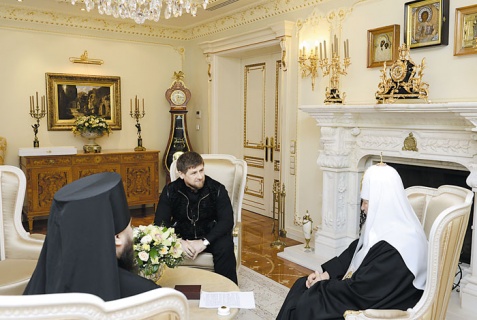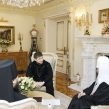
Russian Orthodox Church Becomes Kremlin Tool for Retaining Control Over North Caucasus Muslims
Publication: Eurasia Daily Monitor Volume: 11 Issue: 44
By:

It has been obvious for years already that Moscow’s North Caucasus policy has been coordinated by one of the Kremlin’s working groups on the region. It has been unclear, however, whether this Kremlin working group on the North Caucasus was actually pursuing the same policy for the entire region or adjusting it according to local peculiarities and conditions. In fact, it now appears that there are different sets of policies for the northeastern Caucasus and the northwestern Caucasus, and that the policies toward North Ossetia–Alania and Abkhazia are also separate.
The differences between Russia’s policies toward the northeastern and the northwestern Caucasus could be seen in the anti-Caucasian pressure campaign that was organized by the Kremlin throughout the country (www.magas.ru/content/khronika-sobytii-dpni-fsb-natsionalisty-antikavkazskaya-isteriya). Russian fascists clearly divided these two sub-regions of the North Caucasus: in proposing the expulsion of Caucasians from Russia, they only advocated that natives of the northeastern Caucasus republics—Chechnya, Dagestan and Ingushetia—be singled out for such treatment (https://www.nr2.ru/voting/218.html).
The Kremlin recently gathered the leaders of the northeastern Caucasus for meetings with the head of the Russian Orthodox Church, Patriarch Kirill (https://www.ng.ru/facts/2014-03-05/4_kavkaz.html). The meetings were apparently aimed at demonstrating to the patriarch the loyalty of the leaders of Chechnya, Dagestan and Ingushetia, the three Muslim-majority republics in the northeastern Caucasus.
Each of the three North Caucasian leaders has tried to reap some benefit from these meetings. Dagestan’s Ramazan Abdulatipov was the first leader to meet Patriarch Kirill at his residence in Moscow on February 21. Abdulatipov acted like a junior student before his distinguished professor (https://www.patriarchia.ru/db/text/3574960.html). After lengthy and flowery overtures, Abdulatipov stunned his fellow Dagestanis by stating that Dagestan was almost the cradle of Christianity not only in the North Caucasus, but in the whole of Russia. Based on this statement, Abdulatipov promised to restore an old Christian church in the city of Derbent that dates back to the 4th century, and which was buried for centuries. The restoration is supposed to be completed by the time Derbent marks its 2,000th anniversary. The Patriarch expressed interest in the restoration of the church and promised to support Abdulatipov’s initiative (https://www.pravoslavie.ru/news/68641.htm).
Ramzan Kadyrov met Patriarch Kirill on February 22, the day after his Dagestani colleague. Kadyrov managed to cast the meeting with the leader of the Russian Orthodox Church as a meeting of equal sides better than the other two North Caucasian leaders. He spoke not only as a representative of Chechnya, but as a representative of the entire Muslim community of the country, including the Muslims of Moscow (https://chechnya.gov.ru/page.php?r=126&id=14736). He asked the patriarch for assistance with building mosques in Moscow and other regions of Russia, saying that it is not the believers who are dangerous, but rather those who remain outside the mosques. Kadyrov implied that it is easier to control the masses in the mosques that were built by the state than to allow young people to learn about Islam through the Internet.
Soon after returning to Chechnya from his meeting with the Patriarch, Kadyrov issued a decree to provide Orthodox priests with housing (https://www.interfax-religion.ru/?act=news&div=54653). Given the fact that there are only three Orthodox clergymen in Chechnya, the price for obtaining permission to build mosques in Moscow was not excessive. Moscow’s primary interest is to resolve the issue of the exodus of ethnic Russians from the region. Kadyrov proposed distributing land among Cossacks, so that they could stay and develop agriculture. This solution, however, is unlikely to happen on a large scale, since small producers find it quite difficult to sell their agricultural products.
Following the meetings of the leaders of Dagestan and Chechnya with the patriarch, the question was what the leader of Ingushetia, Yunus-Bek Yevkurov, could offer the head of the Russian Orthodox Church. At his meeting with Patriarch Kirill on February 26, Yevkurov managed only to present him with a keg of mountain honey. Kirill thanked Yevkurov for steering the situation in the republic toward inter-ethnic peace (https://www.regnum.ru/news/1771860.html).
In contrast to his colleagues, Yevkurov also met with the chairman of the Council of Muftis of Russia, Ravil Gainutdinov (https://ingushetia.info/2014/02/26/yunus-bek-evkurov-vstretilsya-s-patriarxom-kirillom.html). Yevkurov thereby showed that he had met not only with the head of the Russian Orthodox Church, but also a Muslim leader. The Russian Orthodox Church has been trying unsuccessfully to retain its presence in the North Caucasus through cooperation with Russian authorities. The ethnic-Russian presence in the northeastern Caucasus is so small now that the question is whether there will be any ethnic Russians at all left in the region in 20 years, given Moscow’s policies in the area (https://www.golos-ameriki.ru/content/russia-caucasus-illarionov-tlisova/1817034.html). The numbers of ethnic Russians living in Ingushetia and Chechnya are now historically so low that the two republics can be safely described as mono-ethnic for the first time since the Russian conquest of the North Caucasus in 1859.
The Russian-Chechen wars and the rise of nationalism among indigenous peoples were the catalysts for the exodus of ethnic Russians from the region (https://rossia3.ru/quotes/5920). Russian President Vladimir Putin attempted to deal with this issue openly (https://www.peoples.ru/state/king/russia/putin/news_putin_iskhod_russkogo_naselenija_-_problema_vsego_.shtml), thereby confirming the gravity of the problem, while the Russian sociologists and demographers had tried to broach it in a more diplomatic way.
The Kremlin decided that only the Christian Orthodox Church which could keep ethnic Russians from leaving the region (https://www.foma.ru/kavkaz-dolgij-put-k-miru.html). It is unclear who invented this idea, but its absurdity is quite obvious, given that not all of the Russians who live in the North Caucasus are even Orthodox Christians (https://cef.ru/publish/smi/?id=446).
Retaining the Christian element in the region at a time of a Muslim resurgence will be quite difficult. Also, support for the idea of a global jihad is gaining more and more adherents among the local population. Furthermore, there is also the problem of ethnic Russians leaving the region because of economic problems (https://www.ng.ru/news/448771.html), but that is not the main reason for the outflow.
The region is not attractive for long-term investment projects, and the plans for retaining ethnic Russians in the ethnic republics of the North Caucasus are unconvincing. Moscow should be paying more attention to the outflow of ethnic Russians from the regions north of the North Caucasian republics, where ethnic Russians are gradually being replaced by North Caucasians. This demographic problem is by far a more worrisome trend than the number of Russians living in the region because these regions represent the new buffer zone between orthodoxy and Islam in the North Caucasus.




